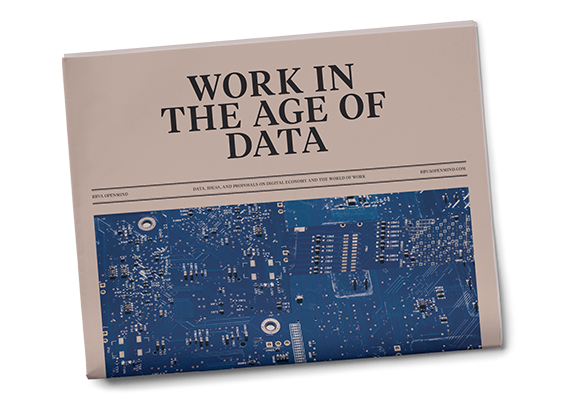Explosive growth in the storage, transmission, and processing capacity of data has changed many aspects of our daily lives. The world of work is no exception. The gig economy, artificial intelligence to complement human resources, chatbots, and prosumers are all realities of the new age of data, which has burst on the scene replete with opportunities, but also with uncertainty and some risks.
In the latest book in the Openmind Collection, “Work in the Age of Data”, over the course of 16 articles, 19 authors explore some of the global challenges we face in this new era. The aim is to foster the discussion and analysis needed so that going forward we can make decisions that will lead to improved working conditions for the population as a whole. This article outlines the primary questions broached by the authors.
1. What influence will institutions and public policy have on the implications of artificial intelligence (AI) on growth and employment?
Economists Philippe Aghion, Céline Antonin, and Simon Bunel talk about the risk of artificial intelligence hindering growth if it is not complemented with adequate competition policy-making.
On the Effects of AI on Growth and Employment
2. Should we continue using productivity as a measure of economic progress?
Professor Diane Coyle warns that technological change makes it more difficult to interpret current productivity figures. She zeroes in on the need to define an accurate measurement for progress and to address current uncertainty.
Measuring Productivity in the Context of Technological Change
3. What is the relationship between the emergence of digital technologies and inequality?
Income inequality has increased in almost all the major advanced economies since the 1980s. Zia Qureshi, a researcher at the Brookings Institution, writes about this complex issue.
4. Do intangible assets help to improve employee productivity?
Intangible capital contributes to improving a company’s productivity, but there is also evidence that it could reduce a return to labor. Professor of Applied Economics, Mary O’Mahony, analyzes this.
Intangible Capital, Productivity and Labor Markets

5. How can you reverse polarization in the job market?
Over the past few decades, there has been a gradual decline in the number of mid-salary jobs, and an increase in the high- and low-salary positions. Professor Michael J. Böhm details the causes.
The Causes and Consequences of Job Polarization, and Their Future Perspectives
6. Are prosumers a threat to paid work?
Those people who have traditionally been consumers are now increasingly taking responsibility for what was previously deemed work (or production). Furthermore, they often do so for free. In this article, Professor Emeritus George Ritzer of the University of Maryland discusses the implications of this shift.
The Increasing Importance of Working Consumers: the Impact on Paid Workers
7. How many jobs do startups really create?
Professor Ellen Ruppel Shell argues that despite popular perception, start-ups and entrepreneurial companies do not create more jobs in the long run. The jobs they do create tend to be shorter-lived and more unstable.
The Hard Realities of Entrepreneurship in a Global Economy
8. What is causing the eruption of the gig economy?
The arrival of the gig economy provoked a rupture in the traditional labor model, which had promised full-time, stable, socially protected, and reliable work. Jamie Woodcock, a researcher at the University of Oxford with a PhD in sociology, analyzes the possible pitfalls this change could represent.

9. What are the consequences of deploying AI in the workplace?
Recently AI has been increasingly used to manage human resources and in businesses’ production. Leading researcher, Doctor Phoebe V. Moore, outlines the advantages and disadvantages related to this development.
Artificial intelligence in the Workplace: What is at Stake for the Workers?
10. Can society recover from social division and populism?
Secretary of State for Global Spain and previously Dean of the School of Global and Public Affairs at IE University, Manuel Muñiz contends that modern and democratic societies must be flexible when defining a new social contract that ensures stability and reshapes the parameters and margins to which we live.
A New Social Contract for The Digital Age
11. What public policies should steer society’s process of technological transformation?
Rafael Domenech, Head of for Economic Analysis at BBVA Research, and Javier Andres, Professor of Economics at the University of Valencia, advocate for well-designed public policy-making that builds on the positive impacts of technological change.
Public Policies in the Age of Digital Disruption
12. How to stem the loss of jobs?
Carmen Pagés, Chief of the Labor Markets Division at the Inter-American Development Bank, calls for a new social pact that ensures individuals’ resilience and good jobs after the fourth industrial revolution.
Institutions, Policies, and Technologies for the Future of Work

13. How should education change in order to prepare students for the digital economy?
Professor Nancy Webster Gleason, PhD advocates for preparing students with resilience training: teaching them to adapt easily and repeatedly to the new truths of knowledge.
The Digital Economy and Learning
14. Will companies of the future be more inclusive?
Companies must begin to prioritize inclusive practices in their human resource management. Writer Alison Maitland describes the advantages diversity brings to innovation, performance, and growth.
The Power of Everyone: Why the Work Revolution Demands a Fresh Focus on Inclusion
15. What qualities are needed for ethical and effective leadership?
Joanne B. Ciulla, Director of the Institute for Ethical Leadership at Rutgers Business School in Newark, maintains that the new age of work demands that leaders also change, becoming more ethical and effective, because history has shown that new technologies in the workplace do not always translate into better working conditions.
Ethical Leadership in a New Age of Work
16. What are the challenges and opportunities — for the world in general, and China in particular — of large-scale AI adoption?
Kai-Fu Lee, founder of the venture capital fund Sinovation Ventures, examines the changes that need to occur globally, taking a special look at China, in order to develop the full potential of AI and improve working lives and productivity.
Artificial intelligence and the Future of Work: a Chinese Perspective

Comments on this publication